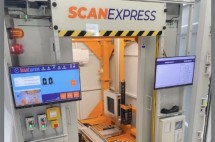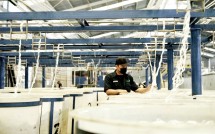July Inflation Influenced by Education Tariff Increase
By : Aldo Bella Putra | Tuesday, August 01 2017 - 13:35 IWST

5166
INDUSTRY.co.id - Jakarta- Central Bureau of Statistics (BPS) noted that the increase of food price and education cost became the main cause of the inflation rate in July 2017 of 0.22 percent.
"Inflation in July is more affected by core inflation, namely the increase in the price of finished food and education costs," said BPS Head Suhariyanto in a press conference in Jakarta on Tuesday (1/8/2017).
Suhariyanto said the core inflation component in this period contributed 0.26 percent inflation, followed by volatile food 0.17 percent and administrated prices 0.07 percent.
"The effect of 'administered prices' is no longer there, because there is no longer any adjustment of the basic electricity tariff rates that were last felt in June for 'volatile food' is also fluctuating thinly," he said.
He explains, from the expenditure group, the biggest inflation in July 2017 occurred in the education, recreation and sports group that is 0.62 percent, due to the new school year.
"Inflation occurs because of the new school year, mainly influenced by the tuition of elementary school, high school tuition and study tuition rates that contributed to inflation respectively 0.01 percent," said Suhariyanto.
Other inflation was affected by the finished food, beverage, cigarette and tobacco group by 0.57 percent, due to rising commodity prices such as noodles, rice with side dishes, sweet coffee and filter clove cigarettes.
Foodstuffs contributed to inflation by 0.21 percent as some commodities still experienced price increases such as fresh fish, eggs, vegetable tomatoes, onions, long beans and oranges.
"However, there are commodities that contribute to deflation such as garlic by 0.07 percent, 0.02 percent of chicken meat and rice and red chili each 0.01 percent," added Suhariyanto.
Other groups contributing to inflation were the health group of 0.15 percent and the housing, water, electricity, gas and fuel and clothing groups by 0.06 percent.
However, the transportation, communication and financial services group during this period contributed to deflation and reduced inflation by 0.08 percent.
"The deflation occurred due to the decrease of inter-city and railway transportation tariffs after Idul Fitri, but air freight rates still contributed to inflation of 0.04 percent," said Suhariyanto.
With inflation in July 2017 at 0.22 percent, the inflation rate for calendar year of January-July 2017 was recorded at 2.6 percent and year-on-year inflation (yoy) of 3.88 percent.
Out of 82 IHK cities, 59 cities experienced inflation and 23 cities contributed to deflation. The highest inflation occurred in Bau-Bau at 2.44 percent and the lowest in Meulaboh by 0.01 percent.
Meanwhile, the highest deflation in this period occurred in Merauke at 1.5 percent and the lowest in Metro and Probolinggo respectively by 0.07 percent.
Read Also
TDL Records New Revenue Record of IDR 25 Trillion in 2024 Ahead of…
Celebrating 65 Years of Indonesia - Cambodia Relations: Indonesian…
President Jokowi Receives 2023 Audit Reports from BPK
SKB Food Collaboration with Bank Mandiri Facilitates Access to MSME…
Sri Mulyani: 2023 Budget Must Stay Flexible in Facing Global Economic…
Today's Industry

Jumat, 02 Mei 2025 - 10:46 WIB
Binawan and Government Support Indonesian Nurses in Europe through Scholarships
In the midst of the viral #KaburAjaDulu hashtag as a symbol of the young generation's disappointment with domestic working conditions, Binawan responded with real action: dispatching Indonesian…

Jumat, 28 Maret 2025 - 22:21 WIB
SUNeVision Initiates MEGA IDC Phase Two Development
SUNeVision, the technology arm of Sun Hung Kai Properties (SHKP), today announced the commencement of construction for Phase Two of MEGA IDC in Tseung Kwan O. As Hong Kong's largest data centre…

Jumat, 28 Maret 2025 - 22:00 WIB
Wireless Logic Selected By Thales As IoT Connectivity Partner
Wireless Logic, a global leader in IoT connectivity solutions has been selected by Thales, a global leader in advanced eSIM technologies, to enable secure, scalable and resilient IoT connectivity…

Jumat, 28 Maret 2025 - 21:53 WIB
Microvista Expands International Presence with Mobile CT System ScanExpress
The German specialist in industrial computed tomography and non-destructive testing, Microvista, announces the European expansion of its innovative mobile CT system, ScanExpress. The system…

Jumat, 28 Maret 2025 - 21:44 WIB
Turning Loss into Profit, INOV Optimistic in Maintaining Positive Performance this Year
PT Inocycle Technology Group Tbk (INOV:IJ) Indonesia's leading and largest PET waste recycling Company managed to book sales of IDR 629 Billion in 2024, an increase of 4.8% compared to the previous…

















News Comment